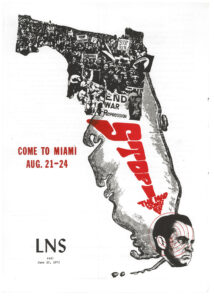Liberation News Service (New York, N.Y.) Records
Founded in 1967, Liberation News Service, an alternative news agency, issued twice-weekly packets aimed at providing inexpensive images, articles, and art reflecting a countercultural outlook. First from its office in Washington, D.C., and then from New York City, LNS provided underground and college papers around the globe with radical and unconventional coverage of the war in Vietnam, global liberation struggles, American politics, and the cultural revolution. Two months after moving to New York City in June 1968, LNS split into two factions, with the sides mirroring common points of dispute within the New Left. The more traditional political and Marxist activists remained in New York, while those more aligned with the counterculture and “hippie” movement settled on farms in western Massachusetts and southern Vermont. For a year each faction put out competing versions of LNS news packets, until the winter conditions and small staff at the farm in Montague caused their production to end in January 1969. LNS-New York continued its production of unique leftist coverage of national and international issues throughout the 1970s, closing in 1981.
The LNS-NY Records include a relatively complete run of packets 102-701 (1968-1975) sent to the subscribing underground press newspaper the Indianapolis Free Press. Some packets and years are more complete than others, and these New York packets are especially dense with photographs compared to earlier LNS packets from before the split in 1968. The collection also includes a small selection of other artwork, articles, and materials kept by the Indianapolis Free Press.
Background on Liberation News Service (New York, N.Y.)
Founded in 1967 when Marshall Bloom and Raymond Mungo were fired from the United States Student Press Association (USSPA) for their radical views, Liberation News Service grew into an impressive alternative news agency during a period of political and social upheaval in the United States and abroad. LNS provided images and text via inexpensive mimeographed news packets mailed out to subscribers, with radical coverage of the war in Vietnam, national liberation struggles abroad, American politics, and the cultural revolution. At its height, LNS had hundreds of subscribers, spanning the gamut of college newspapers and the underground and alternative press. Its readership was estimated to be in the millions.
Located in Washington, D.C., LNS gained initial success and momentum with its coverage of the October 1967 protests at the Pentagon. But, in less than a year the group had tired of both its high rent and the conditions in the nation’s capital in the wake of the assassination of Martin Luther King, Jr., and so officially moved its headquarters to New York City in June 1968.
Two months after moving to NYC, LNS split into two factions, with the sides mirroring common points of dispute from within the leftist movement. The more traditional political and Marxist activists remained in New York, while those more aligned with the countercultural and “hippie” movement settled on farms in western Massachusetts and southern Vermont. The story of LNS, up to and including the split, is told from Mungo’s perspective in his 1970 classic book Famous Long Ago. For a year, each faction put out competing versions of LNS news packets, until the winter conditions and small staff at the farm in Montague caused their production to end in January 1969.
LNS-New York, however, continued throughout the 1970s to produce impressive news packets from the political left on topics often ignored by the mainstream press. Shaping global stories from Vietnam, to South Africa, to Latin America, to the Middle East, and national stories on politics, prison reform, labor movements, and racial, gender, and sexual equality, LNS-NY was a hub of international activists, journalists, and photographers. With the end of the Vietnam War, and the general decline of the New Left, in addition to growing financial instability, LNS-New York ceased its operations in 1981.
Contents of Collection
The Liberation News Service, both its original manifestation and its later separated New York office, operated during a period of exceptionally heightened activity in American political, social, and cultural history. As a whole, the LNS-New York Records document in their news packets and photographs numerous trends stemming from the counterculture, liberation, political, and activist movements in the United States and abroad during from 1968 to 1975.
The LNS-NY Records include a relatively complete run of packets 102-701 (1968-1975) sent to the subscribing underground press newspaper the Indianapolis Free Press. Some packets and years are more complete than others, and there is a gap after June 1972 until August 1973. These New York packets are especially dense with photographs compared to earlier LNS packets from before the split in 1968. The collection also includes a small selection of other artwork, articles, and materials kept by the Indianapolis Free Press.
Administrative information
Access
The collection is open for research.
Language:
English
Provenance
Gift from the Ron Haldeman Collection, Indianapolis, Indiana, courtesy of Thomas P. Healy, January 2018.
Related material
For materials related to the Liberation News Service (New York, N.Y.)Records in Special Collections and University Archives see the various collections, including those of Liberation News Service, Ray Mungo, and Steve Diamond, in the Famous Long Ago Archive.
Additional materials include:
- Diamond, S. (1971). What the Trees Said: Life on a New Age Farm. New York, NY: Delacorte Press.
- Mungo, R. (1970). Famous Long Ago: My Life and Hard Times with Liberation News Service. Boston, MA: Beacon Press.
- The Liberation News Service Photographs collection at Tamiment Library.
- The Liberation News Service Records at the Contemporary Culture Collection of Temple University Libraries.
- The Marshall Bloom Papers and the Bloom Alternative Press Collection in the Amherst College Archives and Special Collections.
Processing Information
Processed by Blake Spitz, February 2018.
Copyright and Use (More information )
)
Cite as: Liberation News Service (New York, N.Y.) Records (MS 1007). Special Collections and University Archives, University of Massachusetts Amherst Libraries.

